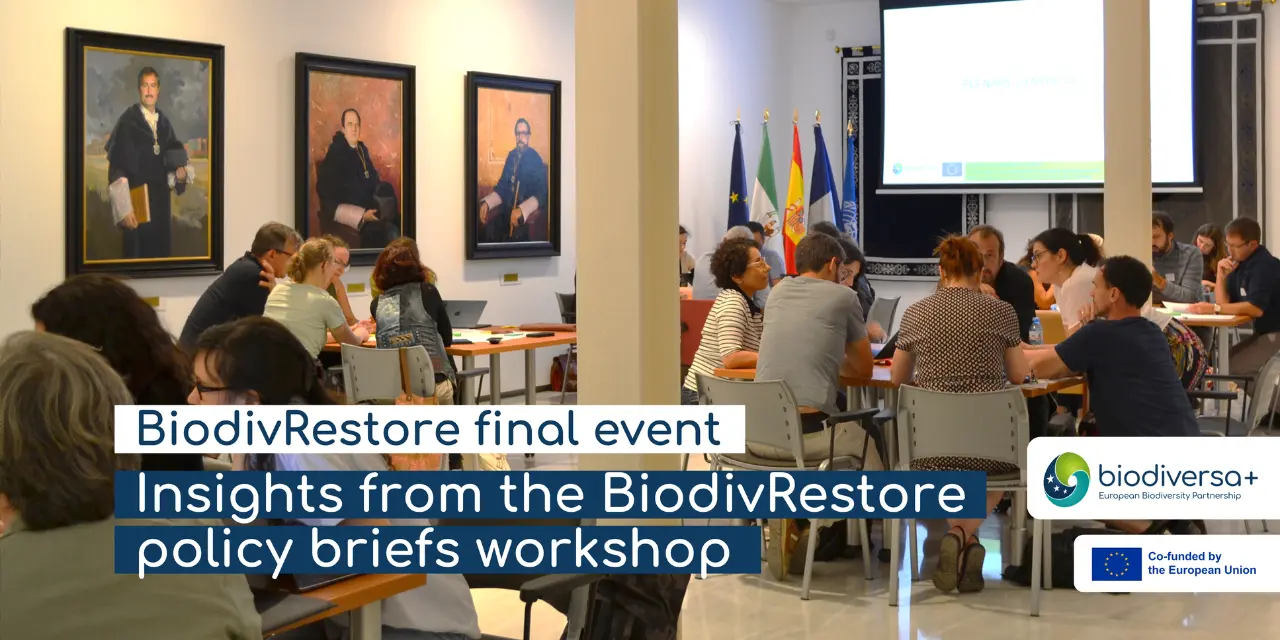The BiodivRestore policy briefs Workshop, held at the University of Málaga on the 23rd of October 2025, as part of the BiodivRestore final conference, brought together the Researchers and partners of BiodivRestore projects, members of the BiodivRestore Knowledge Hub, and representatives from the European Commission.
Together, they worked to develop the framework for four policy briefs delivering actionable, evidence-based recommendations to support the implementation of the EU Nature Restoration Regulation (NRR).
By consolidating the collective knowledge of 22 projects, Biodiversa+ is transforming scientific evidence into actionable policy inputs, advancing the EU’s ambition for large-scale, resilient nature restoration.
From research to policy: Turning evidence into action
The workshop aimed to translate BiodivRestore project results into policy-relevant insights that can directly inform the design and implementation of National Restoration Plans (NRPs). Participants worked to ensure that scientific evidence is aligned with the priorities, constraints, and legal requirements of the NRR and the realities faced by Member States.
The collective ambition was to:
- Translate research evidence into actionable policy recommendations;
- Bridge science and practice through identifying concrete case studies;
- Cluster knowledge across projects to deliver stronger, coherent messaging;
- Deliver timely inputs to inform the 2026-2027 review of the Members States on the National Restoration Plans.
Key lessons and emerging recommendations
From the exchanges between project coordinators, several cross-cutting lessons emerged that will directly inform the policy briefs:
- Governance should be decentralised, transparent, and accountable: Empowering regional and local authorities fosters ownership and flexibility, while ensuring balanced stakeholder processes that address power asymmetries and uphold legal obligations.
- Capacity building and interdisciplinarity are essential: Restoration depends on both technical and social expertise; integrating social sciences and participatory approaches strengthens stakeholder engagement and implementation.
- Sustainable and diversified financing is the backbone of implementation: Long-term funding, including private sector involvement and reoriented subsidies, is vital to sustain monitoring and restoration efforts.
- Stakeholder engagement and local contextualisation are critical: Transparent objectives and locally grounded communication enhance legitimacy and trust.
- Demonstrating the benefits of restoration is essential: Comparing restoration outcomes with the cost and consequences of ‘inaction scenarios’ strengthens both the political and societal case for investment.
- No single indicator can capture ecosystem complexity: Multiple, ecosystem-specific indicators are required to track restoration effectively.
- Uncertainty must be integrated into planning: Restoration strategies should incorporate climate change scenarios and adaptive management to remain robust over time.
Next steps
Building on these insights, four Biodiversa+ policy briefs will be developed, with the aim to provide clear, evidence-based recommendations aligned with the NRR, to offer practical guidance for Member States preparing or revising National Restoration Plans, and to illustrate how biodiversity research under BiodivRestore can directly support effective, science-based restoration policy.




